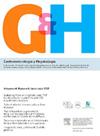炎症性肠病患者接种 SARS-COV 疫苗的依从性和不良事件。
IF 2.2
4区 医学
Q3 GASTROENTEROLOGY & HEPATOLOGY
引用次数: 0
摘要
目的:评估炎症性肠病(IBD)患者接种SARS-COV疫苗的依从性和不良反应:这是一项观察性、分析性、横断面研究。收集了社会人口学和临床数据、SARS-COV 疫苗数据、接种期间使用的治疗 IBD 的药物以及接种期间发生的不良事件。采用稳健方差估计法进行逻辑回归,估算出与相应 95% 置信区间 (95%CI) 的比值比,以评估作为结果变量的接种疫苗后出现非严重不良反应的相关因素:194名患者参与了研究,任何疫苗接种三次的依从性为78.3%(152人)。无论接种哪种疫苗,局部症状和轻微全身症状均占多数。第一剂接种阿斯利康 SARS-COV 疫苗的患者出现疫苗症状的比例较高。阿斯利康疫苗使 IBD 患者出现非严重不良反应的几率增加了 2.65 倍(95% CI:1.38-5.08;P=0.003),与年龄、性别、体力活动、超重、使用疾病调节药物、免疫生物学和皮质类固醇无关。CoronaVac疫苗与首次接种时无症状的患者有关,并将不良反应几率降低了0.28倍(OR:0.284;95%CI:0.13-0.62;p=0.002):结论:无论疫苗类型如何,局部症状和轻微的全身症状均占主导地位。结论:无论疫苗类型如何,局部症状和轻微的全身症状占多数。在第一剂中使用科罗娜疫苗可降低不良反应的发生几率,而使用阿斯利康疫苗则会增加不良反应的风险。本文章由计算机程序翻译,如有差异,请以英文原文为准。
Vaccine adherence and adverse events of the SARS-COV vaccine in patients with inflammatory bowel disease
Objective
To assess adherence to and the adverse effects of the SARS-COV vaccine in patients with inflammatory bowel disease (IBD).
Patients and methods
This is an observational, analytical, cross-sectional study. Sociodemographic and clinical data, SARS-COV vaccine data, medications for IBD with use during the vaccination period, and adverse events during the vaccination period were collected. Carried out logistic regressions with robust variance estimation to estimate the odds ratio with the respective 95% confidence intervals (95%CI) to assess the factors associated with non-serious adverse effects following vaccine doses as outcome variables.
Results
194 patients participated, with vaccine compliance of 78.3% for three doses of any vaccine (n = 152). Local symptoms and mild systemic symptoms predominated, regardless of the type of vaccine. The first dose of the SARS-COV vaccine with AstraZeneca had a higher percentage of patients with vaccine symptoms. AstraZeneca vaccine increased the chance of non-serious adverse effects in IBD patients by 2.65 times (95% CI: 1.38–5.08; p = 0.003), regardless of age, gender, physical activity, excess weight, use of disease-modifying drugs, immunobiological and corticosteroids. CoronaVac vaccine was associated with asymptomatic patients at the first dose and reduced the chance of adverse effects by 0.28 times (OR: 0.284; 95%CI: 0.13–0.62; p = 0.002).
Conclusion
Local symptoms and mild systemic symptoms predominated, regardless of the type of vaccine. Using CoronaVac in the first dose reduced the chances of adverse effects, while AstraZeneca increased the risk of adverse effects.
求助全文
通过发布文献求助,成功后即可免费获取论文全文。
去求助
来源期刊

Gastroenterologia y hepatologia
GASTROENTEROLOGY & HEPATOLOGY-
CiteScore
1.50
自引率
10.50%
发文量
147
审稿时长
48 days
期刊介绍:
Gastroenterology and Hepatology is the first journal to cover the latest advances in pathology of the gastrointestinal tract, liver, pancreas, and bile ducts, making it an indispensable tool for gastroenterologists, hepatologists, internists and general practitioners.
 求助内容:
求助内容: 应助结果提醒方式:
应助结果提醒方式:


